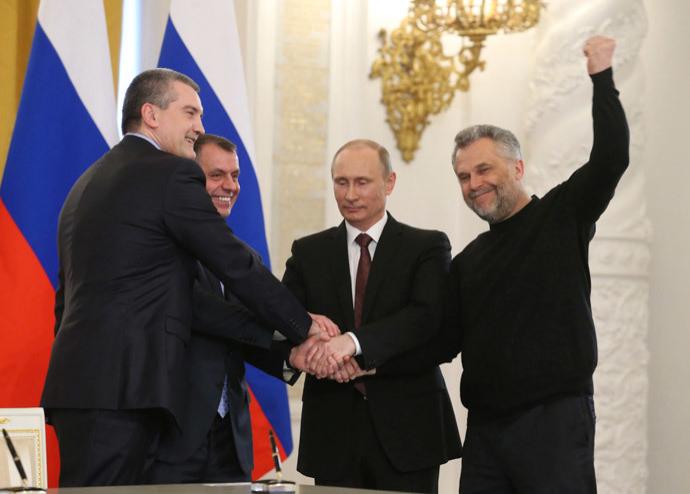
RUSSIA VS THE WEST: AIMS OF SANCTIONS

As the US looks for levers to exert influence over Russia, energy is an obvious choice. Oil and gas generate more than 50 per cent of Russian federal government revenues, and Rosneft and Gazprom, the country's two largest energy companies, are both state controlled.
The problem is that energy binds Russia to the rest of the world in a codependent relationship. Consumers – especially in Europe – need Russian oil and gas as much as Russia needs the revenue they bring in.
The energy sanctions being proposed by the US are intended to circumvent that obstacle.
The plan is to block exports of oil and gas technology only for new projects run by state-controlled companies, with the objective of casting the long-term future of Russia's energy industry into doubt, while safeguarding its short-term contribution to global fuel supplies.
"This situation calls for a scalpel, not a meat axe," says Robin West of the Center for Strategic and International Studies. "We need targeted asymmetric sanctions that hurt them more than they hurt us."
By allowing continued exports of oil and gas equipment and services to Russia's existing oil and gasfields, the proposed sanctions should make very little difference to the country's energy exports.
Russia's exports of crude oil and refined products, totalling about 7m barrels a day, supply 8 per cent of global consumption, while gas exports of about 16bn cubic feet a day meet 30 per cent of Europe's demand.
However, blocking exports of equipment and services for new projects could have a "very meaningful impact on Moscow", according to Jason Bordoff of Columbia University's Center on Global Energy Policy.
Depriving Rosneft and Gazprom of the most modern technology would be a significant setback for their ambitions in the areas that are the future of the Russian industry, including shale oil, liquefied natural gas and the Arctic.
Vladimir Putin, Russia's president, moved in the 2000s to tighten the state's grip on the energy industry and curb the influence of western companies, but more recently has been encouraging deals to bring in the technology and expertise in areas such as drilling and hydraulic fracturing that will be needed to develop the country's more challenging resources.
ExxonMobil of the US in 2011 signed a wide-ranging strategic co-operation agreement with Rosneft, which has since been expanded to include joint exploration of the Arctic Kara, Chukchi and Laptev seas, pilot projects in the Bazhenov and Achimov shales of western Siberia, and a possible new liquefied natural gas plant in the far east of Russia.
Royal Dutch Shell has a similar arrangement with Gazprom, also expanded last year to include exploration in the Arctic and shale development in western Siberia.
Without the help of these and other western companies, such projects would progress much more slowly, if at all, and would face higher costs.
The sanctions would not send Russia's oil and gas production into an immediate slump, but over time the natural decline of existing fields would depress the country's output.
The US government's Energy Information Administration has estimated that the more stringent sanctions imposed on Iran cut its oil production capacity by about 10 per cent to 3.4m barrels a day during 2009-13.
The uncertainty over Russia's long-term prospects in oil and gas would probably also depress the share prices of Rosneft and Gazprom.
Exempting private sector companies would also help their local rivals such as Novatek, the Russian independent gas group, which may be able to go ahead with Yamal LNG, its project with Total of France and CNPC of China, although Gennady Timchenko, the tycoon who owns 23 per cent of Novatek, is under sanction by the US.
The sanctions will be more effective if applied multilaterally. Shell is based outside the US, as are many of the main technology providers. Schlumberger, the oil services group with a large Russian operation, has its legal domicile in the Netherlands Antilles. SeaDrill, which is providing the rig scheduled to drill wells for Exxon in the Kara Sea, is registered in Bermuda.
The US is seeking support from European countries for its plan, but that may not be necessary. Mark Dubowitz of the Foundation for Defense of Democracies points out that when the administration began tightening restrictions on Iran in 2010, "secondary sanctions" were effective in persuading non-US companies to stop doing business there.
The tricky question will be what to do if the Ukraine crisis drags on. As time passes and the effect on Russia's output grows, the strains on world energy markets will become more noticeable, potentially driving up prices for oil and gas.
Mr Bordoff warns: "In a global economy, each of these actions may also come at a cost to the countries imposing the sanctions that needs to be considered."
ft.com





